Deck 7: Matrices and Determinants
Question
Question
Question
Question
Question
Question
Question
Question
Question
Question
Question
Question
Question
Question
Question
Question
Question
Question
Question
Question
Question
Question
Question
Question
Question
Question
Question
Question
Question
Question
Question
Question
Question
Question
Question
Question
Question
Question
Question
Question
Question
Question
Question
Question
Question
Question
Question
Question
Question
Question
Question
Question
Question
Question
Question
Question
Question
Question
Question
Question
Question
Question
Question
Question
Question
Question
Question
Question
Question
Question
Question
Question
Question
Question
Question
Question
Question
Question
Question
Question

Unlock Deck
Sign up to unlock the cards in this deck!
Unlock Deck
Unlock Deck
1/94
Play
Full screen (f)
Deck 7: Matrices and Determinants
1
Solve the system of equations below by the Gaussian elimination method: 


A)
B)
C)
D)
E)no solution



A)

B)

C)

D)

E)no solution
no solution
2
Determine the order of the matrix below. 
A)6
B)
C)
D)5
E)

A)6
B)

C)

D)5
E)


3
Identify the elementary row operation being performed to obtain the new row-equivalent matrix. 
A)Add 2 times R1 to R2.
B)Add -2 times R2 to R1.
C)Add -2 times R1 to R2.
D)Add 2 times R1 to R1.
E)Add 2 times R2 to R1.

A)Add 2 times R1 to R2.
B)Add -2 times R2 to R1.
C)Add -2 times R1 to R2.
D)Add 2 times R1 to R1.
E)Add 2 times R2 to R1.
Add 2 times R2 to R1.
4
Write the matrix in reduced row-echelon form. 
A)
B)
C)
D)
E)

A)

B)

C)

D)

E)


Unlock Deck
Unlock for access to all 94 flashcards in this deck.
Unlock Deck
k this deck
5
Write the augmented matrix of the system of equations below. 
A)
B)
C)
D)
E)

A)

B)

C)

D)

E)


Unlock Deck
Unlock for access to all 94 flashcards in this deck.
Unlock Deck
k this deck
6
Write the system of linear equations represented by the augmented matrix. (Use variables x, y, z, and w.) 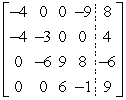
A)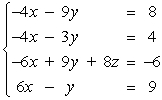
B)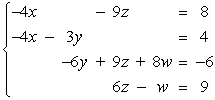
C)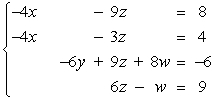
D)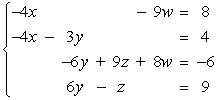
E)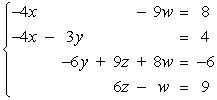

A)

B)

C)

D)

E)


Unlock Deck
Unlock for access to all 94 flashcards in this deck.
Unlock Deck
k this deck
7
Determine whether the matrix is in row-echelon form. If it is, determine if it is also in reduced row-echelon form. 
A)row-echelon form
B)row-echelon form and reduced row-echelon form
C)neither

A)row-echelon form
B)row-echelon form and reduced row-echelon form
C)neither

Unlock Deck
Unlock for access to all 94 flashcards in this deck.
Unlock Deck
k this deck
8
Write the augmented matrix for the system of linear equations. 
A)
B)
C)
D)
E)

A)

B)

C)

D)

E)


Unlock Deck
Unlock for access to all 94 flashcards in this deck.
Unlock Deck
k this deck
9
Use elementary row operations to write the matrix below in row echelon form. 
A)
B)
C)
D)
E)

A)

B)

C)

D)

E)


Unlock Deck
Unlock for access to all 94 flashcards in this deck.
Unlock Deck
k this deck
10
Use matrices to solve the system of equations (if possible). Use Gaussian elimination with back-substitution or Gauss-Jordan elimination. 
A)x = 3, y = -5, z = 4
B)x = -3, y = -5, z = 4
C)x = -3, y = 5, z = 4
D)x = 5, y = 3, z = -4
E)no solution

A)x = 3, y = -5, z = 4
B)x = -3, y = -5, z = 4
C)x = -3, y = 5, z = 4
D)x = 5, y = 3, z = -4
E)no solution

Unlock Deck
Unlock for access to all 94 flashcards in this deck.
Unlock Deck
k this deck
11
Solve the system of equations below by the Gaussian elimination method. 


A)
B)
C)
D)
E)no solution



A)

B)

C)

D)

E)no solution

Unlock Deck
Unlock for access to all 94 flashcards in this deck.
Unlock Deck
k this deck
12
Determine whether the two systems of linear equations yield the same solutions. If so, find the solutions using matrices. 

A)x = -7, y = -6, z = -4
B)x = 7, y = 6, z = -4
C)x = 6, y = -4, z = -7
D)x = -6, y = -4, z = -7
E)The systems yield different solutions.


A)x = -7, y = -6, z = -4
B)x = 7, y = 6, z = -4
C)x = 6, y = -4, z = -7
D)x = -6, y = -4, z = -7
E)The systems yield different solutions.

Unlock Deck
Unlock for access to all 94 flashcards in this deck.
Unlock Deck
k this deck
13
Use matrices to solve the system of equations (if possible). Use Gaussian elimination with back-substitution or Gauss-Jordan elimination. 
A)(53a + 24, 11a + 5, a)where a is any real number
B)(-17a - 15, 14a + 29, a)where a is any real number
C)(72a + 19, 6a + 35, a)where a is any real number
D)(-37a + 24, a + 5, a)where a is any real number
E)(-a + 9, a + 5, a)where a is any real number

A)(53a + 24, 11a + 5, a)where a is any real number
B)(-17a - 15, 14a + 29, a)where a is any real number
C)(72a + 19, 6a + 35, a)where a is any real number
D)(-37a + 24, a + 5, a)where a is any real number
E)(-a + 9, a + 5, a)where a is any real number

Unlock Deck
Unlock for access to all 94 flashcards in this deck.
Unlock Deck
k this deck
14
Fill in the blank using elementary row operations to form a row-equivalent matrix. 
A)
B)
C)
D)
E)

A)

B)

C)

D)

E)


Unlock Deck
Unlock for access to all 94 flashcards in this deck.
Unlock Deck
k this deck
15
Write the system of linear equations represented by the augmented matrix. Then use back-substitution to solve. (Use variables x, y, and z.) 
A)x = 43, y = -5, z = -4
B)x = -1, y = 2, z = -3
C)x = 2, y = 1, z = 3
D)x = 2, y = -1, z = -3
E)x = 1, y = -3, z = -2

A)x = 43, y = -5, z = -4
B)x = -1, y = 2, z = -3
C)x = 2, y = 1, z = 3
D)x = 2, y = -1, z = -3
E)x = 1, y = -3, z = -2

Unlock Deck
Unlock for access to all 94 flashcards in this deck.
Unlock Deck
k this deck
16
Determine whether the two systems of linear equations yield the same solutions. If so, find the solutions using matrices. 

A)x = 4, y = 3, z = 2
B)x = -4, y = -3, z = 2
C)x = -3, y = 2, z = 4
D)x = 3, y = 2, z = 4
E)The systems yield different solutions.


A)x = 4, y = 3, z = 2
B)x = -4, y = -3, z = 2
C)x = -3, y = 2, z = 4
D)x = 3, y = 2, z = 4
E)The systems yield different solutions.

Unlock Deck
Unlock for access to all 94 flashcards in this deck.
Unlock Deck
k this deck
17
An augmented matrix that represents a system of linear equations (in variables x, y, and z) has been reduced using Gauss-Jordan elimination. Write the solution represented by the augmented matrix. 
A)x = -3, y = -6, z = 1
B)x = 3, y = 6, z = -1
C)x = 0, y = 0, z = 0
D)x = -3x, y = y, z = -6z
E)x = -3, y = 0, z = 0

A)x = -3, y = -6, z = 1
B)x = 3, y = 6, z = -1
C)x = 0, y = 0, z = 0
D)x = -3x, y = y, z = -6z
E)x = -3, y = 0, z = 0

Unlock Deck
Unlock for access to all 94 flashcards in this deck.
Unlock Deck
k this deck
18
Determine whether the matrix is in row-echelon form and/or in reduced row-echelon form. 
A)The matrix is in reduced row-echelon form.
B)The matrix is not in row-echelon form but is in reduced row-echelon form.
C)The matrix is in row-echelon form but not in reduced row-echelon form.
D)The matrix is not in row-echelon or in reduced-row echelon form.

A)The matrix is in reduced row-echelon form.
B)The matrix is not in row-echelon form but is in reduced row-echelon form.
C)The matrix is in row-echelon form but not in reduced row-echelon form.
D)The matrix is not in row-echelon or in reduced-row echelon form.

Unlock Deck
Unlock for access to all 94 flashcards in this deck.
Unlock Deck
k this deck
19
Solve the system of equations below by the Gaussian elimination method: 


A)
B)
C)
D)
E)no solution



A)

B)

C)

D)

E)no solution

Unlock Deck
Unlock for access to all 94 flashcards in this deck.
Unlock Deck
k this deck
20
Use matrices to solve the system of equations (if possible). Use Gaussian elimination with back-substitution or Gauss-Jordan elimination. 
A)x = -3, y = 6
B)x = 3, y = -6
C)x = -6, y = 3
D)x = -6, y = -3
E)no solution

A)x = -3, y = 6
B)x = 3, y = -6
C)x = -6, y = 3
D)x = -6, y = -3
E)no solution

Unlock Deck
Unlock for access to all 94 flashcards in this deck.
Unlock Deck
k this deck
21
Find x and y. 
A)x = -4, y = 3
B)x = -4, y = 2
C)x = -3, y = 2
D)x = 3, y = -3
E)no solution

A)x = -4, y = 3
B)x = -4, y = 2
C)x = -3, y = 2
D)x = 3, y = -3
E)no solution

Unlock Deck
Unlock for access to all 94 flashcards in this deck.
Unlock Deck
k this deck
22
Solve for X in the equation given. 
A)
B)
C)
D)
E)

A)

B)

C)

D)

E)


Unlock Deck
Unlock for access to all 94 flashcards in this deck.
Unlock Deck
k this deck
23
A city zoo borrowed $2,000,000 at simple annual interest to construct a breeding facility. Some of the money was borrowed at 3%, some at 5%, and some at 10%. Use a system of equations to determine how much was borrowed at 5% if the total annual interest was $105,000 and the amount borrowed at 3% was twice the amount borrowed at 10%. Solve the system using matrices.
A)$700,000 was borrowed at 5%
B)$500,000 was borrowed at 5%
C)$1,600,000 was borrowed at 5%
D)$1,000,000 was borrowed at 5%
E)$100,000 was borrowed at 5%
A)$700,000 was borrowed at 5%
B)$500,000 was borrowed at 5%
C)$1,600,000 was borrowed at 5%
D)$1,000,000 was borrowed at 5%
E)$100,000 was borrowed at 5%

Unlock Deck
Unlock for access to all 94 flashcards in this deck.
Unlock Deck
k this deck
24
If possible, find AB. 
A)
B)
C)
D)
E)not possible

A)

B)

C)

D)

E)not possible

Unlock Deck
Unlock for access to all 94 flashcards in this deck.
Unlock Deck
k this deck
25
If possible, find A - B. 
A)
B)
C)
D)
E)not possible

A)

B)

C)

D)

E)not possible

Unlock Deck
Unlock for access to all 94 flashcards in this deck.
Unlock Deck
k this deck
26
Use the matrix capabilities of a graphing utility to find AB, if possible. 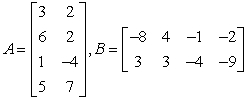
A)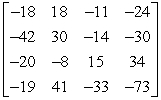
B)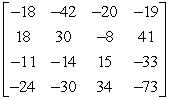
C)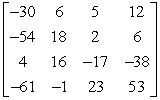
D)
E)not possible

A)

B)

C)

D)

E)not possible

Unlock Deck
Unlock for access to all 94 flashcards in this deck.
Unlock Deck
k this deck
27
Find x and y. 
A)x = 4, y = 9
B)x = -6, y = 7
C)x = -9, y = -4
D)x = -4, y = -9
E)x = -4, y = -4

A)x = 4, y = 9
B)x = -6, y = 7
C)x = -9, y = -4
D)x = -4, y = -9
E)x = -4, y = -4

Unlock Deck
Unlock for access to all 94 flashcards in this deck.
Unlock Deck
k this deck
28
If possible, find AB. 
A)
B)
C)
D)
E)not possible

A)

B)

C)

D)

E)not possible

Unlock Deck
Unlock for access to all 94 flashcards in this deck.
Unlock Deck
k this deck
29
Use the matrix capabilities of a graphing utility to find AB, if possible. 
A)
B)
C)
D)
E)not possible

A)

B)

C)

D)

E)not possible

Unlock Deck
Unlock for access to all 94 flashcards in this deck.
Unlock Deck
k this deck
30
Find A2. (Note: A2 = AA.) 
A)
B)
C)
D)
E)not possible

A)

B)

C)

D)

E)not possible

Unlock Deck
Unlock for access to all 94 flashcards in this deck.
Unlock Deck
k this deck
31
Evaluate the expression. 
A)
B)
C)
D)
E)not possible

A)

B)

C)

D)

E)not possible

Unlock Deck
Unlock for access to all 94 flashcards in this deck.
Unlock Deck
k this deck
32
Solve for X in the equation given. 
A)
B)
C)
D)
E)not possible

A)

B)

C)

D)

E)not possible

Unlock Deck
Unlock for access to all 94 flashcards in this deck.
Unlock Deck
k this deck
33
Use the matrix capabilities of a graphing utility to evaluate the expression. 
A)
B)
C)
D)
E)not possible

A)

B)

C)

D)

E)not possible

Unlock Deck
Unlock for access to all 94 flashcards in this deck.
Unlock Deck
k this deck
34
Use the matrix capabilities of a graphing utility to evaluate the expression. 
A)
B)
C)
D)
E)

A)

B)

C)

D)

E)


Unlock Deck
Unlock for access to all 94 flashcards in this deck.
Unlock Deck
k this deck
35
Find 


A)
B)
C)
D)
E)



A)

B)

C)

D)

E)


Unlock Deck
Unlock for access to all 94 flashcards in this deck.
Unlock Deck
k this deck
36
Evaluate the expression. 
A)
B)
C)
D)
E)not possible

A)

B)

C)

D)

E)not possible

Unlock Deck
Unlock for access to all 94 flashcards in this deck.
Unlock Deck
k this deck
37
Find 


A)
B)
C)
D)
E)



A)

B)

C)

D)

E)


Unlock Deck
Unlock for access to all 94 flashcards in this deck.
Unlock Deck
k this deck
38
If possible, find 4A + 5B. 
A)
B)
C)
D)
E)not possible

A)

B)

C)

D)

E)not possible

Unlock Deck
Unlock for access to all 94 flashcards in this deck.
Unlock Deck
k this deck
39
Find 

A)
B)
C)
D)
E)


A)

B)

C)

D)

E)


Unlock Deck
Unlock for access to all 94 flashcards in this deck.
Unlock Deck
k this deck
40
Find 

A)
B)
C)
D)
E)


A)

B)

C)

D)

E)


Unlock Deck
Unlock for access to all 94 flashcards in this deck.
Unlock Deck
k this deck
41
Solve the system of linear equations  using an inverse matrix.
using an inverse matrix.
A)
B)
C)
D)
E)
 using an inverse matrix.
using an inverse matrix.A)

B)

C)

D)

E)


Unlock Deck
Unlock for access to all 94 flashcards in this deck.
Unlock Deck
k this deck
42
Find the inverse of the matrix below, if it exists. 
A)
B)
C)
D)
E)The inverse of the matrix does not exist.

A)

B)

C)

D)

E)The inverse of the matrix does not exist.

Unlock Deck
Unlock for access to all 94 flashcards in this deck.
Unlock Deck
k this deck
43
Write the system of linear equations as a matrix equation  and then use Gauss-Jordan elimination on the augmented matrix
and then use Gauss-Jordan elimination on the augmented matrix  to solve for the the matrix
to solve for the the matrix 

A)
B)
C)
D)
E)
 and then use Gauss-Jordan elimination on the augmented matrix
and then use Gauss-Jordan elimination on the augmented matrix  to solve for the the matrix
to solve for the the matrix 

A)

B)

C)

D)

E)


Unlock Deck
Unlock for access to all 94 flashcards in this deck.
Unlock Deck
k this deck
44
Find the inverse of the matrix  .
.
A)
B)
C)
D)
E)
 .
.A)

B)

C)

D)

E)


Unlock Deck
Unlock for access to all 94 flashcards in this deck.
Unlock Deck
k this deck
45
Find the inverse of the matrix  (if it exists).
(if it exists).
A)
B)
C)
D)
E)does not exist
 (if it exists).
(if it exists).A)

B)

C)

D)

E)does not exist

Unlock Deck
Unlock for access to all 94 flashcards in this deck.
Unlock Deck
k this deck
46
A fruit grower raises apples and peaches, which are shipped to three different outlets. The number of units of each fruit that is shipped to each outlet is shown in the matrix 
 where the first row contains the data for the number of apples shipped, the second row contains the data for the number of peaches shipped, and the columns correspond to outlets X, Y, and Z respectively. The profit per unit of apples is $4.50 and the profit per unit of peaches is $5.00. Organize the profits per unit in a matrix
where the first row contains the data for the number of apples shipped, the second row contains the data for the number of peaches shipped, and the columns correspond to outlets X, Y, and Z respectively. The profit per unit of apples is $4.50 and the profit per unit of peaches is $5.00. Organize the profits per unit in a matrix 
 Compute
Compute  to find the profits from both crops at outlet
to find the profits from both crops at outlet 
A)$1737.50
B)$937.50
C)$1512.50
D)$1312.50
E)$750.00

 where the first row contains the data for the number of apples shipped, the second row contains the data for the number of peaches shipped, and the columns correspond to outlets X, Y, and Z respectively. The profit per unit of apples is $4.50 and the profit per unit of peaches is $5.00. Organize the profits per unit in a matrix
where the first row contains the data for the number of apples shipped, the second row contains the data for the number of peaches shipped, and the columns correspond to outlets X, Y, and Z respectively. The profit per unit of apples is $4.50 and the profit per unit of peaches is $5.00. Organize the profits per unit in a matrix 
 Compute
Compute  to find the profits from both crops at outlet
to find the profits from both crops at outlet 
A)$1737.50
B)$937.50
C)$1512.50
D)$1312.50
E)$750.00

Unlock Deck
Unlock for access to all 94 flashcards in this deck.
Unlock Deck
k this deck
47
Find the inverse of the matrix  (if it exists).
(if it exists).
A)
B)
C)
D)
E)does not exist
 (if it exists).
(if it exists).A)

B)

C)

D)

E)does not exist

Unlock Deck
Unlock for access to all 94 flashcards in this deck.
Unlock Deck
k this deck
48
Two competing companies offer cable television to a city with 100,000 households. Gold Cable Company has 10,000 subscribers and Galaxy Cable Company has 15,000 subscribers. The percent changes in cable subscriptions each year are shown in the matrix below  where the columns are percent changes from Gold, from Galaxy, and from Nonsubscriber respectively and the rows are percent changes to Gold, to Galaxy, and to Nonsubscriber respectively. Find the number of nonsubscribers in two years using matrix multiplication.
where the columns are percent changes from Gold, from Galaxy, and from Nonsubscriber respectively and the rows are percent changes to Gold, to Galaxy, and to Nonsubscriber respectively. Find the number of nonsubscribers in two years using matrix multiplication.
A)60,500
B)12,750
C)26,750
D)36,690
E)49,900
 where the columns are percent changes from Gold, from Galaxy, and from Nonsubscriber respectively and the rows are percent changes to Gold, to Galaxy, and to Nonsubscriber respectively. Find the number of nonsubscribers in two years using matrix multiplication.
where the columns are percent changes from Gold, from Galaxy, and from Nonsubscriber respectively and the rows are percent changes to Gold, to Galaxy, and to Nonsubscriber respectively. Find the number of nonsubscribers in two years using matrix multiplication.A)60,500
B)12,750
C)26,750
D)36,690
E)49,900

Unlock Deck
Unlock for access to all 94 flashcards in this deck.
Unlock Deck
k this deck
49
Given matrix  . Find
. Find  the inverse matrix.
the inverse matrix.
A)
B)
C)
D)
E)
 . Find
. Find  the inverse matrix.
the inverse matrix.A)

B)

C)

D)

E)


Unlock Deck
Unlock for access to all 94 flashcards in this deck.
Unlock Deck
k this deck
50
Solve the system of linear equations  using an inverse matrix.
using an inverse matrix.
A)
B)
C)
D)
E)
 using an inverse matrix.
using an inverse matrix.A)

B)

C)

D)

E)


Unlock Deck
Unlock for access to all 94 flashcards in this deck.
Unlock Deck
k this deck
51
Use the matrix capabilities of a graphing utility to find the inverse of the matrix  (if it exists).
(if it exists).
A)
B)
C)
D)
E)does not exist
 (if it exists).
(if it exists).A)

B)

C)

D)

E)does not exist

Unlock Deck
Unlock for access to all 94 flashcards in this deck.
Unlock Deck
k this deck
52
You invest in AAA-rated bonds, A-rated bonds, and B-rated bonds. Your average yield is 8% on AAA bonds, 9% on A bonds, and 10% on B bonds. You invest twice as much in B bonds as in A bonds. The desired system of linear equations (where 
 and
and  represent the amounts invested in AAA, A, and B bonds, respectively) is as follows.
represent the amounts invested in AAA, A, and B bonds, respectively) is as follows.  Use the inverse of the coefficient matrix of this system to find the amount invested in B bonds for the given a total investment of $18,000 and annual return of $1640.
Use the inverse of the coefficient matrix of this system to find the amount invested in B bonds for the given a total investment of $18,000 and annual return of $1640.
A)$8000
B)$6000
C)$9000
D)$1000
E)$2000

 and
and  represent the amounts invested in AAA, A, and B bonds, respectively) is as follows.
represent the amounts invested in AAA, A, and B bonds, respectively) is as follows.  Use the inverse of the coefficient matrix of this system to find the amount invested in B bonds for the given a total investment of $18,000 and annual return of $1640.
Use the inverse of the coefficient matrix of this system to find the amount invested in B bonds for the given a total investment of $18,000 and annual return of $1640.A)$8000
B)$6000
C)$9000
D)$1000
E)$2000

Unlock Deck
Unlock for access to all 94 flashcards in this deck.
Unlock Deck
k this deck
53
Find which of the following matrices is an inverse to the matrix A below if any. 
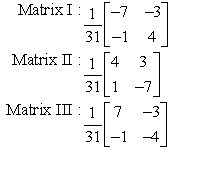
A)Each of the matrices I and II is an inverse of A.
B)Each of the matrices I and III is an inverse of A.
C)Matrix II is an inverse of A.
D)Matrix I is an inverse of A.
E)None of the matrices is an inverse of A.


A)Each of the matrices I and II is an inverse of A.
B)Each of the matrices I and III is an inverse of A.
C)Matrix II is an inverse of A.
D)Matrix I is an inverse of A.
E)None of the matrices is an inverse of A.

Unlock Deck
Unlock for access to all 94 flashcards in this deck.
Unlock Deck
k this deck
54
Find A2. (Note: A2 = AA.) 
A)
B)
C)
D)
E)not possible

A)

B)

C)

D)

E)not possible

Unlock Deck
Unlock for access to all 94 flashcards in this deck.
Unlock Deck
k this deck
55
A convention planning service has identified three suitable hotels for a convention. The quoted room rates are for single, double, triple, and quadruple occupancy. The current cost for each type of room at each hotel is represented by the matrix 
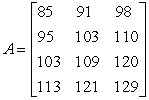 where the columns correspond to each hotel and the rows correspond to single, double, triple, and quadruple occupancy respectively. If room rates are guaranteed not to increase by more than 10% by the time of the convention, what is the maximum rate per room per hotel?
where the columns correspond to each hotel and the rows correspond to single, double, triple, and quadruple occupancy respectively. If room rates are guaranteed not to increase by more than 10% by the time of the convention, what is the maximum rate per room per hotel?
A)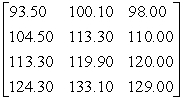
B)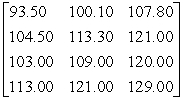
C)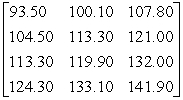
D)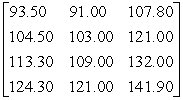
E)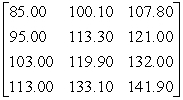

 where the columns correspond to each hotel and the rows correspond to single, double, triple, and quadruple occupancy respectively. If room rates are guaranteed not to increase by more than 10% by the time of the convention, what is the maximum rate per room per hotel?
where the columns correspond to each hotel and the rows correspond to single, double, triple, and quadruple occupancy respectively. If room rates are guaranteed not to increase by more than 10% by the time of the convention, what is the maximum rate per room per hotel?A)

B)

C)

D)

E)


Unlock Deck
Unlock for access to all 94 flashcards in this deck.
Unlock Deck
k this deck
56
Find the inverse of the given matrix. 
A)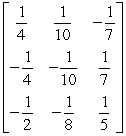
B)
C)
D)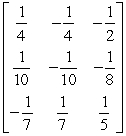
E)The matrix does not have an inverse.

A)

B)

C)

D)

E)The matrix does not have an inverse.

Unlock Deck
Unlock for access to all 94 flashcards in this deck.
Unlock Deck
k this deck
57
Find the inverse of the matrix  .
.
A)
B)
C)
D)
E)
 .
.A)

B)

C)

D)

E)


Unlock Deck
Unlock for access to all 94 flashcards in this deck.
Unlock Deck
k this deck
58
Use the matrix capabilities of a graphing utility to find the inverse of the matrix 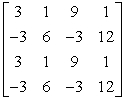 (if it exists).
(if it exists).
A)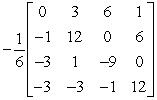
B)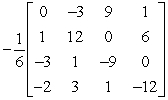
C)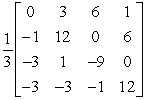
D)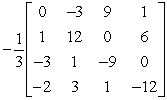
E)does not exist
 (if it exists).
(if it exists).A)

B)

C)

D)

E)does not exist

Unlock Deck
Unlock for access to all 94 flashcards in this deck.
Unlock Deck
k this deck
59
Find 

A)
B)
C)
D)
E)


A)

B)

C)

D)

E)


Unlock Deck
Unlock for access to all 94 flashcards in this deck.
Unlock Deck
k this deck
60
Use the matrix capabilities of a graphing utility to solve the following system of linear equations: 
A)
B)
C)
D)
E)

A)

B)

C)

D)

E)


Unlock Deck
Unlock for access to all 94 flashcards in this deck.
Unlock Deck
k this deck
61
Find the determinant of  by the method of expansion by cofactors using column 3. Show your work.
by the method of expansion by cofactors using column 3. Show your work.
 by the method of expansion by cofactors using column 3. Show your work.
by the method of expansion by cofactors using column 3. Show your work.
Unlock Deck
Unlock for access to all 94 flashcards in this deck.
Unlock Deck
k this deck
62
Find all (a) minors and (b) cofactors of the matrix  . Show your work.
. Show your work.
 . Show your work.
. Show your work.
Unlock Deck
Unlock for access to all 94 flashcards in this deck.
Unlock Deck
k this deck
63
Find all (a) minors and (b) cofactors of the matrix  . Show your work.
. Show your work.
 . Show your work.
. Show your work.
Unlock Deck
Unlock for access to all 94 flashcards in this deck.
Unlock Deck
k this deck
64
Use the matrix capabilities of a graphing utility to find the determinant of the matrix 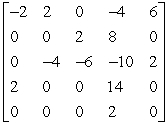 .
.
A)
B)
C)
D)
E)
 .
.A)

B)

C)

D)

E)


Unlock Deck
Unlock for access to all 94 flashcards in this deck.
Unlock Deck
k this deck
65
Find the determinant of  .
.
A)
B)
C)
D)
E)
 .
.A)

B)

C)

D)

E)


Unlock Deck
Unlock for access to all 94 flashcards in this deck.
Unlock Deck
k this deck
66
Evaluate the determinant by expanding by cofactors. 
A)
B)
C)
D)
E)

A)

B)

C)

D)

E)


Unlock Deck
Unlock for access to all 94 flashcards in this deck.
Unlock Deck
k this deck
67
Find the determinant of the matrix  .
.
A)
B)
C)
D)
E)
 .
.A)

B)

C)

D)

E)


Unlock Deck
Unlock for access to all 94 flashcards in this deck.
Unlock Deck
k this deck
68
Find the determinant of  .
.
A)
B)
C)
D)
E)
 .
.A)

B)

C)

D)

E)


Unlock Deck
Unlock for access to all 94 flashcards in this deck.
Unlock Deck
k this deck
69
Use the matrix capabilities of a graphing utility to find the determinant of the matrix 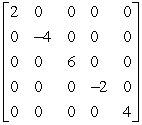 .
.
A)
B)
C)
D)
E)
 .
.A)

B)

C)

D)

E)


Unlock Deck
Unlock for access to all 94 flashcards in this deck.
Unlock Deck
k this deck
70
Which of the following  upper triangular matrices has a determinant equal to -8.
upper triangular matrices has a determinant equal to -8. 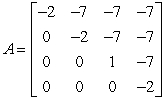
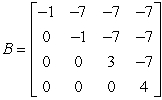
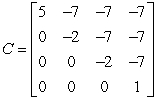
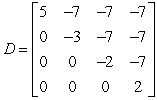
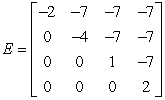
A)matrix A
B)matrix D
C)matrix C
D)matrix E
E)matrix B
 upper triangular matrices has a determinant equal to -8.
upper triangular matrices has a determinant equal to -8. 




A)matrix A
B)matrix D
C)matrix C
D)matrix E
E)matrix B

Unlock Deck
Unlock for access to all 94 flashcards in this deck.
Unlock Deck
k this deck
71
Find the determinant of the matrix  .
.
A)
B)
C)
D)
E)
 .
.A)

B)

C)

D)

E)


Unlock Deck
Unlock for access to all 94 flashcards in this deck.
Unlock Deck
k this deck
72
Use the matrix capabilities of a graphing utility to find the determinant of the matrix  .
.
A)
B)
C)
D)
E)
 .
.A)

B)

C)

D)

E)


Unlock Deck
Unlock for access to all 94 flashcards in this deck.
Unlock Deck
k this deck
73
Given  and
and  , find
, find  .
.
A)
B)
C)
D)
E)
 and
and  , find
, find  .
.A)

B)

C)

D)

E)


Unlock Deck
Unlock for access to all 94 flashcards in this deck.
Unlock Deck
k this deck
74
Evaluate the determinant of the matrix below. 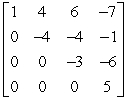
A)-9
B)1
C)-1
D)60
E)32

A)-9
B)1
C)-1
D)60
E)32

Unlock Deck
Unlock for access to all 94 flashcards in this deck.
Unlock Deck
k this deck
75
Use a determinant to find the area of the triangle shown below. 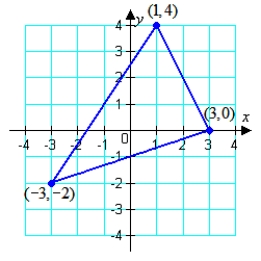
A)
B)
C)
D)
E)

A)

B)

C)

D)

E)


Unlock Deck
Unlock for access to all 94 flashcards in this deck.
Unlock Deck
k this deck
76
Consider the circuit shown in the figure below. The currents ![<strong>Consider the circuit shown in the figure below. The currents ( in amperes ) are the solutions to the system of linear equations , where are voltages of 6 and 9 volts, respectively. Use the inverse of the coefficient matrix of this system to find the unknown currents. Round answers to nearest tenth. [Hint: If a current value turns out to be negative, it simply means that the current flow is in the opposite direction from that indicated in the figure below.] </strong> A) B) C) D) E)](https://storage.examlex.com/TB8692/11eb99ec_1231_ff30_bdc5_c15e571d5cc2_TB8692_11.jpg) ( in amperes ) are the solutions to the system of linear equations
( in amperes ) are the solutions to the system of linear equations ![<strong>Consider the circuit shown in the figure below. The currents ( in amperes ) are the solutions to the system of linear equations , where are voltages of 6 and 9 volts, respectively. Use the inverse of the coefficient matrix of this system to find the unknown currents. Round answers to nearest tenth. [Hint: If a current value turns out to be negative, it simply means that the current flow is in the opposite direction from that indicated in the figure below.] </strong> A) B) C) D) E)](https://storage.examlex.com/TB8692/11eb99ec_1231_ff31_bdc5_d5fa1cb43930_TB8692_11.jpg) , where
, where ![<strong>Consider the circuit shown in the figure below. The currents ( in amperes ) are the solutions to the system of linear equations , where are voltages of 6 and 9 volts, respectively. Use the inverse of the coefficient matrix of this system to find the unknown currents. Round answers to nearest tenth. [Hint: If a current value turns out to be negative, it simply means that the current flow is in the opposite direction from that indicated in the figure below.] </strong> A) B) C) D) E)](https://storage.examlex.com/TB8692/11eb99ec_1231_ff32_bdc5_ff04a8c32f77_TB8692_11.jpg) are voltages of 6 and 9 volts, respectively. Use the inverse of the coefficient matrix of this system to find the unknown currents. Round answers to nearest tenth. [Hint: If a current value turns out to be negative, it simply means that the current flow is in the opposite direction from that indicated in the figure below.]
are voltages of 6 and 9 volts, respectively. Use the inverse of the coefficient matrix of this system to find the unknown currents. Round answers to nearest tenth. [Hint: If a current value turns out to be negative, it simply means that the current flow is in the opposite direction from that indicated in the figure below.] ![<strong>Consider the circuit shown in the figure below. The currents ( in amperes ) are the solutions to the system of linear equations , where are voltages of 6 and 9 volts, respectively. Use the inverse of the coefficient matrix of this system to find the unknown currents. Round answers to nearest tenth. [Hint: If a current value turns out to be negative, it simply means that the current flow is in the opposite direction from that indicated in the figure below.] </strong> A) B) C) D) E)](https://storage.examlex.com/TB8692/11eb99ec_1232_2643_bdc5_31cf7413594a_TB8692_11.jpg)
![<strong>Consider the circuit shown in the figure below. The currents ( in amperes ) are the solutions to the system of linear equations , where are voltages of 6 and 9 volts, respectively. Use the inverse of the coefficient matrix of this system to find the unknown currents. Round answers to nearest tenth. [Hint: If a current value turns out to be negative, it simply means that the current flow is in the opposite direction from that indicated in the figure below.] </strong> A) B) C) D) E)](https://storage.examlex.com/TB8692/11eb99ec_1232_2644_bdc5_252fe5af9985_TB8692_00.jpg)
A)![<strong>Consider the circuit shown in the figure below. The currents ( in amperes ) are the solutions to the system of linear equations , where are voltages of 6 and 9 volts, respectively. Use the inverse of the coefficient matrix of this system to find the unknown currents. Round answers to nearest tenth. [Hint: If a current value turns out to be negative, it simply means that the current flow is in the opposite direction from that indicated in the figure below.] </strong> A) B) C) D) E)](https://storage.examlex.com/TB8692/11eb99ec_1232_2645_bdc5_950d9e12bef1_TB8692_11.jpg)
B)![<strong>Consider the circuit shown in the figure below. The currents ( in amperes ) are the solutions to the system of linear equations , where are voltages of 6 and 9 volts, respectively. Use the inverse of the coefficient matrix of this system to find the unknown currents. Round answers to nearest tenth. [Hint: If a current value turns out to be negative, it simply means that the current flow is in the opposite direction from that indicated in the figure below.] </strong> A) B) C) D) E)](https://storage.examlex.com/TB8692/11eb99ec_1232_4d56_bdc5_534231e6bbaa_TB8692_11.jpg)
C)![<strong>Consider the circuit shown in the figure below. The currents ( in amperes ) are the solutions to the system of linear equations , where are voltages of 6 and 9 volts, respectively. Use the inverse of the coefficient matrix of this system to find the unknown currents. Round answers to nearest tenth. [Hint: If a current value turns out to be negative, it simply means that the current flow is in the opposite direction from that indicated in the figure below.] </strong> A) B) C) D) E)](https://storage.examlex.com/TB8692/11eb99ec_1232_4d57_bdc5_dd2857db46dc_TB8692_11.jpg)
D)![<strong>Consider the circuit shown in the figure below. The currents ( in amperes ) are the solutions to the system of linear equations , where are voltages of 6 and 9 volts, respectively. Use the inverse of the coefficient matrix of this system to find the unknown currents. Round answers to nearest tenth. [Hint: If a current value turns out to be negative, it simply means that the current flow is in the opposite direction from that indicated in the figure below.] </strong> A) B) C) D) E)](https://storage.examlex.com/TB8692/11eb99ec_1232_4d58_bdc5_89637421867d_TB8692_11.jpg)
E)![<strong>Consider the circuit shown in the figure below. The currents ( in amperes ) are the solutions to the system of linear equations , where are voltages of 6 and 9 volts, respectively. Use the inverse of the coefficient matrix of this system to find the unknown currents. Round answers to nearest tenth. [Hint: If a current value turns out to be negative, it simply means that the current flow is in the opposite direction from that indicated in the figure below.] </strong> A) B) C) D) E)](https://storage.examlex.com/TB8692/11eb99ec_1232_7469_bdc5_0b8262a66de4_TB8692_11.jpg)
![<strong>Consider the circuit shown in the figure below. The currents ( in amperes ) are the solutions to the system of linear equations , where are voltages of 6 and 9 volts, respectively. Use the inverse of the coefficient matrix of this system to find the unknown currents. Round answers to nearest tenth. [Hint: If a current value turns out to be negative, it simply means that the current flow is in the opposite direction from that indicated in the figure below.] </strong> A) B) C) D) E)](https://storage.examlex.com/TB8692/11eb99ec_1231_ff30_bdc5_c15e571d5cc2_TB8692_11.jpg) ( in amperes ) are the solutions to the system of linear equations
( in amperes ) are the solutions to the system of linear equations ![<strong>Consider the circuit shown in the figure below. The currents ( in amperes ) are the solutions to the system of linear equations , where are voltages of 6 and 9 volts, respectively. Use the inverse of the coefficient matrix of this system to find the unknown currents. Round answers to nearest tenth. [Hint: If a current value turns out to be negative, it simply means that the current flow is in the opposite direction from that indicated in the figure below.] </strong> A) B) C) D) E)](https://storage.examlex.com/TB8692/11eb99ec_1231_ff31_bdc5_d5fa1cb43930_TB8692_11.jpg) , where
, where ![<strong>Consider the circuit shown in the figure below. The currents ( in amperes ) are the solutions to the system of linear equations , where are voltages of 6 and 9 volts, respectively. Use the inverse of the coefficient matrix of this system to find the unknown currents. Round answers to nearest tenth. [Hint: If a current value turns out to be negative, it simply means that the current flow is in the opposite direction from that indicated in the figure below.] </strong> A) B) C) D) E)](https://storage.examlex.com/TB8692/11eb99ec_1231_ff32_bdc5_ff04a8c32f77_TB8692_11.jpg) are voltages of 6 and 9 volts, respectively. Use the inverse of the coefficient matrix of this system to find the unknown currents. Round answers to nearest tenth. [Hint: If a current value turns out to be negative, it simply means that the current flow is in the opposite direction from that indicated in the figure below.]
are voltages of 6 and 9 volts, respectively. Use the inverse of the coefficient matrix of this system to find the unknown currents. Round answers to nearest tenth. [Hint: If a current value turns out to be negative, it simply means that the current flow is in the opposite direction from that indicated in the figure below.] ![<strong>Consider the circuit shown in the figure below. The currents ( in amperes ) are the solutions to the system of linear equations , where are voltages of 6 and 9 volts, respectively. Use the inverse of the coefficient matrix of this system to find the unknown currents. Round answers to nearest tenth. [Hint: If a current value turns out to be negative, it simply means that the current flow is in the opposite direction from that indicated in the figure below.] </strong> A) B) C) D) E)](https://storage.examlex.com/TB8692/11eb99ec_1232_2643_bdc5_31cf7413594a_TB8692_11.jpg)
![<strong>Consider the circuit shown in the figure below. The currents ( in amperes ) are the solutions to the system of linear equations , where are voltages of 6 and 9 volts, respectively. Use the inverse of the coefficient matrix of this system to find the unknown currents. Round answers to nearest tenth. [Hint: If a current value turns out to be negative, it simply means that the current flow is in the opposite direction from that indicated in the figure below.] </strong> A) B) C) D) E)](https://storage.examlex.com/TB8692/11eb99ec_1232_2644_bdc5_252fe5af9985_TB8692_00.jpg)
A)
![<strong>Consider the circuit shown in the figure below. The currents ( in amperes ) are the solutions to the system of linear equations , where are voltages of 6 and 9 volts, respectively. Use the inverse of the coefficient matrix of this system to find the unknown currents. Round answers to nearest tenth. [Hint: If a current value turns out to be negative, it simply means that the current flow is in the opposite direction from that indicated in the figure below.] </strong> A) B) C) D) E)](https://storage.examlex.com/TB8692/11eb99ec_1232_2645_bdc5_950d9e12bef1_TB8692_11.jpg)
B)
![<strong>Consider the circuit shown in the figure below. The currents ( in amperes ) are the solutions to the system of linear equations , where are voltages of 6 and 9 volts, respectively. Use the inverse of the coefficient matrix of this system to find the unknown currents. Round answers to nearest tenth. [Hint: If a current value turns out to be negative, it simply means that the current flow is in the opposite direction from that indicated in the figure below.] </strong> A) B) C) D) E)](https://storage.examlex.com/TB8692/11eb99ec_1232_4d56_bdc5_534231e6bbaa_TB8692_11.jpg)
C)
![<strong>Consider the circuit shown in the figure below. The currents ( in amperes ) are the solutions to the system of linear equations , where are voltages of 6 and 9 volts, respectively. Use the inverse of the coefficient matrix of this system to find the unknown currents. Round answers to nearest tenth. [Hint: If a current value turns out to be negative, it simply means that the current flow is in the opposite direction from that indicated in the figure below.] </strong> A) B) C) D) E)](https://storage.examlex.com/TB8692/11eb99ec_1232_4d57_bdc5_dd2857db46dc_TB8692_11.jpg)
D)
![<strong>Consider the circuit shown in the figure below. The currents ( in amperes ) are the solutions to the system of linear equations , where are voltages of 6 and 9 volts, respectively. Use the inverse of the coefficient matrix of this system to find the unknown currents. Round answers to nearest tenth. [Hint: If a current value turns out to be negative, it simply means that the current flow is in the opposite direction from that indicated in the figure below.] </strong> A) B) C) D) E)](https://storage.examlex.com/TB8692/11eb99ec_1232_4d58_bdc5_89637421867d_TB8692_11.jpg)
E)
![<strong>Consider the circuit shown in the figure below. The currents ( in amperes ) are the solutions to the system of linear equations , where are voltages of 6 and 9 volts, respectively. Use the inverse of the coefficient matrix of this system to find the unknown currents. Round answers to nearest tenth. [Hint: If a current value turns out to be negative, it simply means that the current flow is in the opposite direction from that indicated in the figure below.] </strong> A) B) C) D) E)](https://storage.examlex.com/TB8692/11eb99ec_1232_7469_bdc5_0b8262a66de4_TB8692_11.jpg)

Unlock Deck
Unlock for access to all 94 flashcards in this deck.
Unlock Deck
k this deck
77
Given  , find
, find  .
.
A)
B)
C)
D)
E)
 , find
, find  .
.A)

B)

C)

D)

E)


Unlock Deck
Unlock for access to all 94 flashcards in this deck.
Unlock Deck
k this deck
78
Use the matrix capabilities of a graphing utility to find the determinant of the matrix  .
.
A)
B)
C)
D)
E)
 .
.A)

B)

C)

D)

E)


Unlock Deck
Unlock for access to all 94 flashcards in this deck.
Unlock Deck
k this deck
79
Find the determinant of the matrix below. Expand by cofactors on the row or column that appears to make the computations easiest. 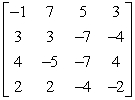
A)766
B)990
C)94
D)234
E)-146

A)766
B)990
C)94
D)234
E)-146

Unlock Deck
Unlock for access to all 94 flashcards in this deck.
Unlock Deck
k this deck
80
Find the determinant of  by the method of expansion by cofactors.
by the method of expansion by cofactors.
A)
B)
C)
D)
E)
 by the method of expansion by cofactors.
by the method of expansion by cofactors.A)

B)

C)

D)

E)


Unlock Deck
Unlock for access to all 94 flashcards in this deck.
Unlock Deck
k this deck


